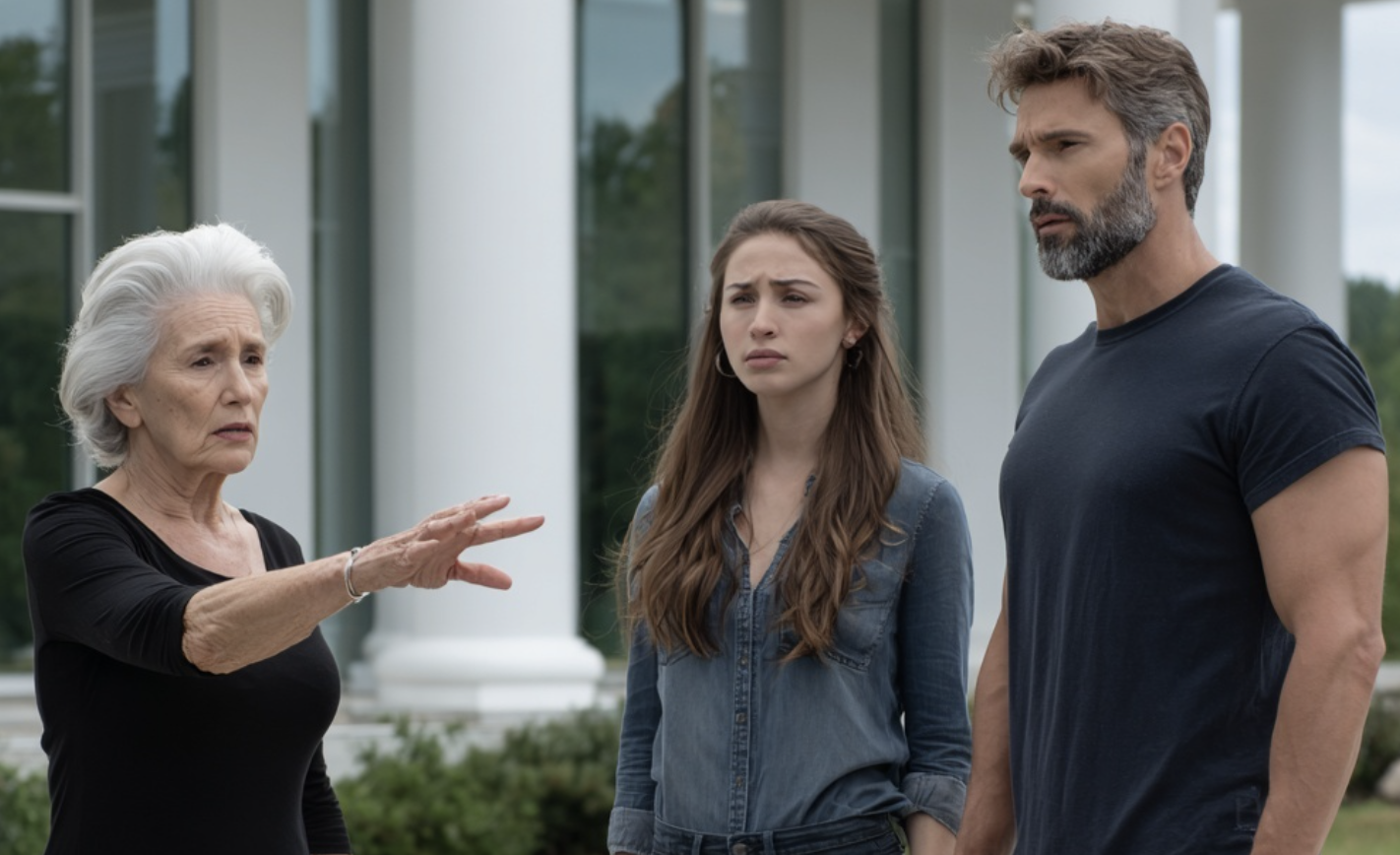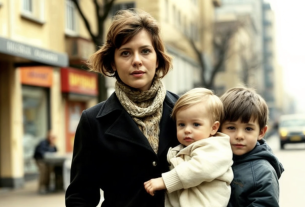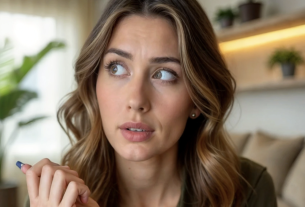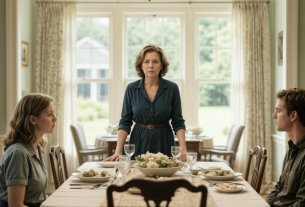Andrei set the last box of dishes on the kitchen table and wiped the sweat from his forehead. The move was finished—at last he and Lyuda were the full-fledged owners of their own country house. Two years of construction, endless weekend trips out to the plot, arguments with contractors, choosing materials, sleepless nights over the plans—all of that was behind them.
“Lyud, look how beautifully the sun lights up the terrace,” he called to his wife, who was unpacking things in the bedroom. “And remember how Mom said we’d lost our minds, selling the apartment for this ‘dacha scheme’?”
Lyuda came out onto the terrace, slipped an arm around her husband’s shoulders, and looked at the view opening before them. Behind the house stretched a dense pine forest, and through the trees the river glinted. The air was so clean that, after the city stuffiness, it felt almost tangible.
“Your mom wasn’t the only one who thought we were crazy,” Lyuda laughed. “Remember what your sister Olya said? ‘Why do you need this backwater when you have everything at your fingertips in the city—shops, theaters, clinics?’”
“Well, now we’ll see who was right,” Andrei said contentedly. “We’ve got a workshop for my projects, your office for work, a gym, a living room with a fireplace. And most importantly—peace and quiet.”
Lyuda worked as an editor at a publishing house and did most of her job remotely. Andrei was a designer—for him, the country house was not just a place to live, but a working laboratory. Here he could experiment, create, and bring ideas to life.
Selling their three-room city apartment had allowed them not only to build the house but also to set up the grounds. Granted, the money had been just enough—every kopeck counted. But now they had their own world, created to suit their taste and needs.
The first weeks were spent getting settled. Andrei laid out a garden; Lyuda made the house homey, chose curtains, arranged books. In the evenings they sat on the terrace, listened to the birds sing, and planned the future.
“You know,” Lyuda mused aloud, “I think we did the right thing by not inviting anyone to a housewarming right away. First we needed to live in everything ourselves, to understand how we live here.”
“I agree. Although we’ll have to start receiving guests soon. Mom’s already called three times asking when she can come see our ‘madness.’”
They decided to invite relatives in early June, when the garden would be in bloom and they could show the house at its best. Andrei even planted fast-growing flowers so the grounds would look lived-in by the time the guests arrived.
On the appointed day, Andrei’s mother, Valentina Petrovna, and his sister Olya with her two children—seven-year-old Maksim and ten-year-old Katya—came by commuter train. Andrei met them at the station.
“My God, it’s so beautiful here!” Olya exclaimed as soon as she stepped out of the car. “And the air! Kids, breathe deep!”
Valentina Petrovna walked around the house in silence, peered in the windows, and shook her head.
“Well, Mom, what’s the verdict?” Andrei asked with a smile.
“I admit, son, it turned out well. Though I still think a city apartment is more practical.”
Lyuda gave them a tour of the house. She showed the living room with a fireplace, the kitchen-dining room, the offices, Andrei’s workshop, the gym. The guests oohed and aahed.
“What a spacious workshop!” Olya marveled. “You could fit a whole studio in here.”
“And the library—it’s just like in a movie!” added Valentina Petrovna. “And the fireplace is real. What’s that room next to the kitchen?”
“That’s the pantry,” Lyuda explained. “We keep tools there, gardening gear, preserves.”
“And upstairs?”
“Our bedroom is up there, and another room—we’re calling it the guest room for now.”
After the tour, they settled on the terrace. Lyuda served tea with homemade pie, and the children ran off to explore the grounds.
“It’s so lovely here!” Olya said dreamily. “Do you hear the birds singing? And the air! And the forest nearby! There must be mushrooms, right?”
“There are—locals say the crop is good in August and September,” Andrei confirmed.
“Just imagine—we could take the kids mushroom picking!” Olya went on. “And is the river far?”
“About ten minutes on foot through the woods.”
“Wonderful! And could you set up a vegetable garden?”
“Of course, there’s plenty of space.”
Valentina Petrovna nodded thoughtfully.
“Yes, it’s nice here. Quiet, calm. After the city bustle—pure paradise. And how good this is for the children! Fresh air, nature, none of those harmful exhaust fumes.”
Maksim came running from the yard.
“Uncle Andrei, can we hang a swing on that big spruce? And make a sandbox too?”
“We can,” Andrei laughed. “Just not right now—next time you come to visit.”
“And when will we come?” Katya immediately asked.
“We’ll work that out,” Andrei replied evasively.
Olya and Valentina Petrovna exchanged glances.
“What if we come stay with you a little longer this summer?” Olya suggested cautiously. “The kids are on break, and breathing fresh air would be so good for them.”
“And it wouldn’t hurt me, either,” the mother-in-law added. “After winter the body is run-down, and here it’s such a blessing.”
Lyuda felt a small twinge of unease but decided it was too early to worry—maybe they were just talking about a weekend.
“How long were you thinking?” she asked.
“Well, I was thinking maybe two months,” Olya said dreamily. “My vacation is in July–August, right when the kids are off school.”
“I could do the whole summer,” added Valentina Petrovna. “The city is hot and stuffy, and here it’s beautiful!”
Andrei and Lyuda looked at each other. Something in their relatives’ tone was unsettling.
“Mom, you have a dacha,” Andrei reminded her.
“I do, but it’s just a little house with two tiny rooms. And here, it’s spacious—so beautiful! And anyway, a family should be together.”
The conversation drifted to other topics, but Lyuda noticed how carefully Olya and her mother-in-law were looking over the house, as if assessing and sizing things up.
At lunch, Valentina Petrovna praised the kitchen:
“How convenient! So much space, and a big window. Cooking here would be a joy. And what a modern stove!”
“Yes, we chose a functional kitchen on purpose,” Lyuda agreed. “I love to cook.”
“And I adore canning,” the mother-in-law said. “Just imagine how many preserves we could make! Cucumbers, tomatoes, jam from wild berries. There’s so much room in the pantry!”
After lunch the children ran off to the yard again, and the adults stayed on the terrace. Olya talked about her vacation plans:
“You know, I keep thinking maybe I won’t go to the seaside this year. It’s so expensive, and what’s the point—two weeks fly by and that’s it. Here we could have a calm rest, it’s good for the kids, and we’d save money.”
“A sensible thought,” agreed Valentina Petrovna. “Why waste money on pricey resorts when it’s so beautiful here? And the air is better than any seaside resort.”
“Aren’t you afraid you’ll be bored here?” Lyuda asked carefully. “You’re city people, used to civilization.”
“Bored?” Olya was surprised. “Goodness, no! There’s so much to do! Picking mushrooms, berries, going to the river, sunbathing. And how interesting it will be for the children—nature, animals, birds.”
“And I’ll find things to do as well,” the mother-in-law added. “I’ll set up a vegetable patch, plant flowers. And in the evenings we can read in that wonderful library.”
Lyuda tried to object:
“But you used to say a dacha is drudgery, and a garden is just extra hassle…”
“I did,” Valentina Petrovna agreed. “But that’s a dacha—this is different. Everything here is well thought out and convenient. And it’s a pleasure to live in such a house.”
By evening, the guests were getting ready to leave. The children didn’t want to abandon the new, interesting place and begged to stay longer.
“Next time,” Olya promised. “We’ll come again very soon.”
“And when exactly?” Maksim asked.
“Well…” Olya looked at Andrei and Lyuda. “Maybe next weekend already?”
“We’ll see,” Andrei answered evasively.
Seeing the guests off, Lyuda noticed how Valentina Petrovna took one more careful look around the house, as if committing the details to memory.
“You’ve got a good house,” she said. “You can live here.”
That evening, after the guests left, Andrei and Lyuda sat on the terrace discussing the day.
“I have a strange feeling,” Lyuda admitted. “It seemed to me your relatives were looking at our house not as guests, but as future residents.”
“You weren’t imagining it,” Andrei sighed. “I noticed it too. Especially when Mom asked about the pantry and the vegetable garden.”
“And Olya kept talking about her summer plans as if she’d already decided to spend it here.”
“We’ll have to explain delicately that we’re not ready for long-term stays.”
But they had to explain much sooner than they thought. On Wednesday, Valentina Petrovna called:
“Son, Olya and I want to come this weekend. And bring a few things.”
“What kind of things, Mom?”
“Oh, summer clothes, books, some medicine. Just in case.”
“Mom, how long are you planning to stay?”
“We haven’t decided yet. Maybe a week, maybe longer. We’ll see how things go.”
A wave of anxiety washed over Andrei.
“But Mom, we don’t have the conditions for a long stay. There’s one guest room, and even that isn’t very set up.”
“That’s all right, we’re not picky. The main thing is the air and the quiet. We’ll figure it out.”
On Saturday Olya and Valentina Petrovna arrived with enormous bags. The children lugged backpacks stuffed with toys and books.
“Here we are!” Olya announced cheerfully. “Now we’ll live like one big family!”
“Live how?” Andrei didn’t understand.
“Well, I took vacation starting Monday,” his sister explained. “I think a month and a half should do. And Mom is free until September.”
“We decided we don’t need the city heat,” added Valentina Petrovna. “Better to spend the summer here, in the fresh air.”
Lyuda felt everything inside her clench. She looked at her husband—he stood there, mouth open.
“But you used to say our idea of moving out of the city was utter nonsense,” Andrei said, bewildered.
“We did,” his mother agreed. “But now that we’ve seen the result, we realize we were wrong. You’ve made a real paradise here.”
Olya was already directing the children:
“Maksim, Katya, go see which room will be yours. I’ll discuss with Aunt Lyuda how best to organize the household.”
“What room?” Lyuda asked again.
“Well, you said yourself there’s a guest room upstairs,” Olya reminded her. “And Mom and I can take the library—there’s a comfortable sofa.”
“The library?” Lyuda was horrified.
“What, is that a problem?” Valentina Petrovna was surprised. “Or the workshop. There’s space there too.”
Andrei tried to object:
“Mom, the workshop is my workplace. And the library—we read there and work.”
“It’s fine, we’ll squeeze in,” the mother-in-law waved it off. “The important thing is there’s room for everyone.”
The children were already tearing through the house, picking their corners. Maksim declared he would sleep in the guest room, and Katya wanted to set herself up in the library.
“Kids, don’t rush,” Lyuda tried to stop them. “We haven’t discussed everything yet.”
“What is there to discuss?” Olya shrugged. “The house is big; there’s room for everyone. We’ll live as one big, happy family.”
Valentina Petrovna was already inspecting the kitchen:
“Lyudochka, where do you keep your big pots? I’ll make a big pot of borscht for the whole family. And I’ll bake pies.”
“Wait,” Lyuda said, flustered. “I think there’s been some kind of misunderstanding.”
“What misunderstanding?” the mother-in-law didn’t get it.
Andrei and Lyuda exchanged glances. The situation was slipping out of control.
“Mom, Olya, let’s sit down and talk calmly,” Andrei suggested.
They sat in the living room. The children kept racing through the house, exploring.
“We’re very glad you liked our house,” Lyuda began. “But when we invited you to the housewarming, we meant a normal weekend visit.”
“And we decided it would be better to spend the summer with you than suffer in the city heat,” Olya explained. “Is it so bad for the family to be together?”
“It’s not bad, but…” Andrei searched for words. “We just don’t have the conditions for long-term living for this many people.”
“What do you mean, you don’t?” his mother was surprised. “The house is huge; there are plenty of rooms.”
“Mom, every room has its purpose. The workshop is my workplace; the library is also a work zone—clients come there, and Lyuda and I work there.”
“And what is the guest room for?” Olya asked, quite logically.
“For guests who come for a day or two,” Lyuda explained. “Not for permanent residence.”
Valentina Petrovna took offense.
“So your own family aren’t guests to you, just some second-rate people?”
“That’s not it,” Andrei said patiently. “We built the house for ourselves, to meet our needs. We work from home; we need quiet and focus.”
“And what, we’ll be a bother?” Olya flared up. “We’re quiet people.”
At that moment Maksim ran in from the garden with a loud yell—he’d scratched himself on a rosebush. Katya followed, wailing—she’d bumped herself somewhere too.
“Very quiet,” Lyuda muttered.
Andrei stood up and said firmly:
“Mom, Olya, I think there’s been a misunderstanding. We’d be happy to have you as guests, but for a few days, no more.”
“A few days?” the mother-in-law protested. “What are we supposed to do all summer—suffocate in the city?”
“You have a dacha, Mom,” her son reminded her.
“A dacha!” Valentina Petrovna snorted disdainfully. “A forty-square-meter shack compared to your palace.”
She was silent for a moment.
“So you’ve built yourselves a ‘palace’! And which room will be mine? And my daughter’s?”
Silence fell. Andrei and Lyuda finally understood what was going on—the relatives had been considering their house as shared family property from the very beginning.
“Mom,” Andrei said slowly, “this is our house. We built it with our own money, by selling our apartment.”
“So what?” his sister didn’t get it. “Isn’t family supposed to support each other?”
“Support—yes. But that doesn’t mean we’re obliged to give you lodging for the entire summer.”
“I see,” Valentina Petrovna said coolly. “So when you needed approval for your ‘crazy’ project, you didn’t turn to us. And now that everything turned out well, your own family has become a burden.”
“Mom, you’re twisting things,” Andrei said wearily. “We never asked anyone to approve our project. And we didn’t ask for help. We did everything ourselves.”
“And I remember you complaining you didn’t have enough money for the finishing work,” the mother-in-law reminded him.
“I complained, yes, but I didn’t ask to borrow money. And you, by the way, said you didn’t have money for any ‘nonsense.’”
Lyuda decided to step in:
“Look, let’s not be offended. We really are happy to see you, but please understand—the house was designed for our needs. We have work areas; we can’t turn them into bedrooms.”
“Couldn’t you have planned rooms for family from the start?” Olya asked reproachfully.
“For which family?” Andrei didn’t understand. “You have your own apartment, and Mom has hers. Why would we build rooms for you?”
“Well, you never know what might happen. Family should be ready to help each other.”
“Helping is one thing. Providing a place to live for free is quite another.”
Valentina Petrovna stood up.
“I get it. You built yourselves a palace, got stuck-up, and forgot your relatives. Well, we see our place in your life.”
“Mom, don’t make a drama out of this,” Andrei pleaded. “Stay for the weekend, relax. But long-term living isn’t possible.”
“And the children?” Olya asked. “They like it so much here, and you’re depriving them of a chance to spend the summer in nature.”
“Olya, you have vacation time—you can take the kids wherever you want. To the sea, to Mom’s dacha, to your in-laws’ village.”
“That’s not the same,” his sister muttered. “The conditions there aren’t like these.”
“What conditions exactly are you after?” Lyuda asked bluntly.
Olya hesitated:
“Well… the house is beautiful, the yard is big, the forest is close…”
“So what attracts you is our house, not the desire to spend time with us,” Andrei concluded.
“What’s that got to do with it? We’re family!”
“A family that spent two years criticizing our decision and calling us crazy,” Lyuda reminded her.
“Well, we were wrong!” Valentina Petrovna exclaimed. “People can be wrong! And now we see you were right. And we want to enjoy the result too.”
The conversation reached an impasse. The children kept racing around, not understanding what was happening. Olya and the mother-in-law sat there with offended expressions.
At last Andrei said decisively:
“All right. Let’s agree on this: you stay until Sunday, relax, enjoy nature. Then you go home. In the summer you can come for weekends—we’ll always be glad to see you.”
“And for vacation?” Olya pressed.
“A week is possible, but not a month and a half.”
“This is ridiculous!” his sister protested. “You’ve got a house for fifty people and no room for your own family!”
“It’s not that there’s no room physically, it’s that there’s no room functionally,” Lyuda explained patiently. “Imagine: the kids are tearing through the house from morning till night, I can’t work in my office, Andrei can’t work in his workshop. The library turns into a bedroom, the kitchen is chaos from cooking for a crowd. That’s not rest—that’s nonstop stress.”
“We’ll do everything ourselves,” the mother-in-law assured her. “We’ll cook, clean, dig in the garden.”
“Mom, you don’t understand. We moved here for peace and quiet. With you it turns into a communal apartment.”
Gradually, tempers cooled. By evening everyone had come to terms with the situation. Olya and the mother-in-law, though dissatisfied, realized it was useless to insist.
“All right,” Valentina Petrovna said at last. “We’ll stay till Sunday. But it’s hurtful, son. We thought family was sacred.”
“Family is sacred,” Andrei agreed. “But there have to be boundaries. We’re ready to have you as guests, to help, to support. But we’re not ready to live as one big commune.”
“And we thought that since the house is big, we’d all fit,” Olya said sadly.
“The house is big, but every square meter has its purpose,” Lyuda explained. “We can’t turn workspaces into living quarters.”
The weekend passed fairly peacefully. The children got their fill of playing in the garden; the adults chatted unhurriedly on the terrace. Valentina Petrovna couldn’t resist and laid out a small bed of greens, and Olya gathered a bouquet of wildflowers.
“It’s so nice here,” she sighed on Sunday evening. “It’s a pity to leave.”
“Come again,” Lyuda invited. “In a month the raspberries will ripen, and in autumn—mushrooms.”
“And a week in the summer is definitely okay?” Olya clarified.
“Of course. Just let us know in advance.”
Seeing the guests off, Valentina Petrovna said:
“You know, son, maybe it’s for the best. We’re used to the city, and here it really is a bit out of the way. And the mosquitoes bite.”
“And the kids need friends in the city,” Olya added. “Though nature is wonderful, of course.”
When the relatives left, Andrei and Lyuda were once again alone in their house. The evening quiet felt especially precious after a weekend full of children’s shouts and adult conversations.



